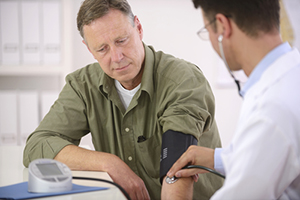 Canadian scientists published an interesting study in the Annals of Emergency Medicine in June 2016, suggesting the thinking behind high blood pressure needs to be altered.
Canadian scientists published an interesting study in the Annals of Emergency Medicine in June 2016, suggesting the thinking behind high blood pressure needs to be altered.
Yes, it’s dangerous, that’s for sure.
But not in the way that most of us have been lead to believe. And how you approach your high blood pressure should drastically change.
The Canadian team originally set out to examine the trends and patterns of emergency room (ER) visits and hospitalizations for high blood pressure.
Primarily they wanted to learn if those who visited ERs were the same people who ended up being hospitalized, and to ascertain the seriousness of the health consequences of these ER visitors.
To do this, they analyzed 206,147 ER visits from 180 locations in Canada between 2002 and 2012.
During this period, there was a 28% decrease in hospitalizations due to high blood pressure.
Great news, right?
Kind-of, because they also found that there was a 64 percent increase in ER visits for high blood pressure during this time.
In other words, while fewer people are hospitalized for hypertension every year, more people rushed to ERs with it.
Charitably, the scientists decided against simply brushing off these ER visitors as hypochondriacs, and examined their long-term health outcomes, just in case they should have been hospitalized but were not.
They found that almost none of them died within 90 days of the ER visit, meaning that these visits were not such great emergencies after all.
So the already burdened ERs are being clogged with people who should rather have brought this issue up with their personal doctor.
Those who were hospitalized were suffering signs of heart attack and stroke. You should definitely rush to the nearest ER if you experience those symptoms, such as chest pain, intense headache, nausea, or shortness of breath. But high blood pressure alone is not an immediate risk.
Normally, people with home blood pressure monitors measure their blood pressure, after which they might either ignore or forget the score if it is low enough, or rush to the hospital if it is very high.
Only especially diligent individuals write down their scores and compare them across different times. For best results, measure your blood pressure three times per day, always at the same time and then take the daily average. Compare at least 7 days of data before panicking.
However, if you have untreated high blood pressure, you’ll almost unavoidably suffer heart attack or stroke at some point, so it’s essential to bring it down.

 Multiple Sclerosis
Multiple Sclerosis Banishing Bronchitis
Banishing Bronchitis Gum Disease Gone
Gum Disease Gone Overcoming Onychomycosis
Overcoming Onychomycosis Neuropathy No More
Neuropathy No More The Prostate Protocol
The Prostate Protocol Brain Booster
Brain Booster
 Ironbound
Ironbound
 Solution for Shingles
Solution for Shingles
 The Bone Density Solution
The Bone Density Solution
 The Ultimate Healing Protocol
The Ultimate Healing Protocol
 The Parkinson's Protocol
The Parkinson's Protocol
 The Chronic Kidney Disease Solution
The Chronic Kidney Disease Solution
 Overthrowing Anxiety
Overthrowing Anxiety The Fatty Liver Solution
The Fatty Liver Solution The Hypothyroidism Solution
The Hypothyroidism Solution
 The End of Gout
The End of Gout The Blood Pressure Program
The Blood Pressure Program
 The Oxigized Cholesterol Strategy
The Oxigized Cholesterol Strategy
 Stop Snoring And Sleep Apnea Program
Stop Snoring And Sleep Apnea Program
 The Arthritis Strategy
The Arthritis Strategy The Vertigo & Dizziness Program
The Vertigo & Dizziness Program The 3-Step Diabetes Strategy
The 3-Step Diabetes Strategy Hemorrhoids Healing Protocol
Hemorrhoids Healing Protocol The Erectile Dysfunction Master
The Erectile Dysfunction Master Weight Loss Breeze
Weight Loss Breeze The IBS Program
The IBS Program The Insomnia Program
The Insomnia Program The Migraine and Headache Program
The Migraine and Headache Program The Neck Pain Solution
The Neck Pain Solution The Menopause Solution
The Menopause Solution The Ejaculation Master
The Ejaculation Master The TMJ Solution
The TMJ Solution The Acid Reflux Solution
The Acid Reflux Solution The Fibromyalgia Solution
The Fibromyalgia Solution The Psoriasis Strategy
The Psoriasis Strategy